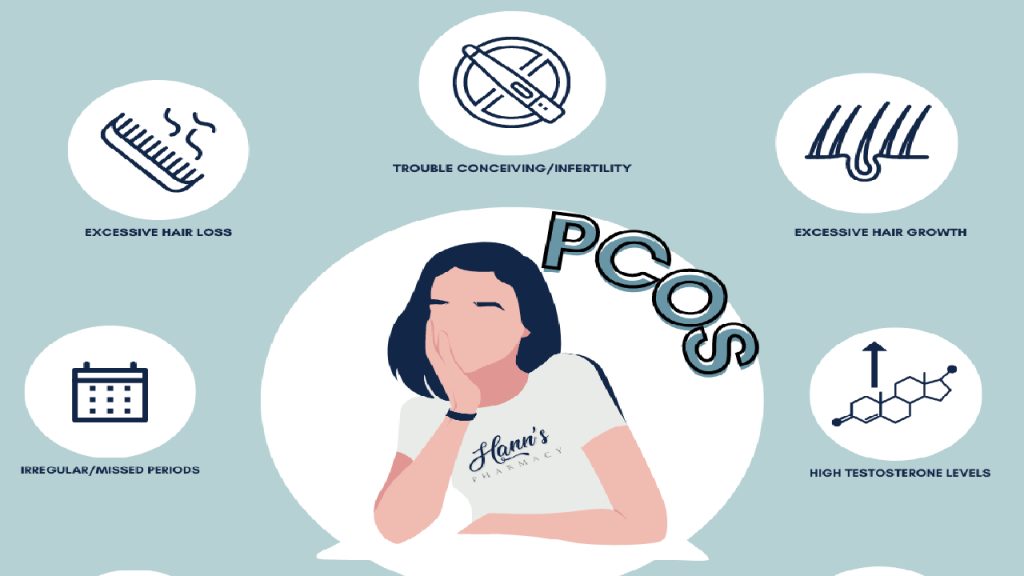Polycystic ovary syndrome (PCOS) is a common hormonal condition that affects women of reproductive age. It usually starts during adolescence, but symptoms may fluctuate over time.
PCOS can cause hormonal imbalances, irregular periods, excess androgen levels and cysts in the ovaries. Irregular periods, usually with a lack of ovulation, can make it difficult to become pregnant. PCOS is a leading cause of infertility.
PCOS is a chronic condition and cannot be cured. However, some symptoms can be improved through lifestyle changes, medications and fertility treatments.
Types of PCOS
Some scientists propose dividing PCOS into types based on symptoms and hormone levels:
- Full-blown PCOS (type A): You have high levels of androgens, problems with ovulation, as well as cysts on your ovaries.
- Non-PCO PCOS (type B): You have high levels of androgens as well as problems with ovulation.
- Ovulatory PCOS (type C): You have increased levels of androgens along with cysts on your ovaries.
- Non-hyperandrogenic PCOS, or type D: You have problems with ovulation (which can lead to irregular periods or loss of periods) and cysts on your ovaries. But your levels of androgens (male hormones) are normal.
Informally, you might hear people describe it using other terms that refer to its causes or symptoms:
- Inflammatory PCOS. Inflammation results when your immune system tries to fight off a threat.Research has linked PCOS to low levels of inflammation throughout the body. This could cause or worsen symptoms. Conditions such as insulin resistance and obesity contribute to inflammation.
- Insulin-resistant PCOS. Often, those who have PCOS also have insulin resistance, which is when your body makes the hormone insulin but can’t use it correctly. Insulin resistance increases your risk for type 2 diabetes.
- Pill-induced PCOS or post-pill PCOS. The pill and other hormonal birth control methods don’t cause PCOS. But when you stop using this type of birth control, you could temporarily have irregular periods or other symptoms that look like those of PCOS. Hormonal birth control can also mask the symptoms of PCOS. So you might not be diagnosed with it until you go off birth control. Doctors sometimes prescribe hormonal birth control to treat PCOS symptoms.
- Hidden-cause PCOS. Some websites use this term to refer to PCOS for which the cause isn’t known. But this is true of PCOS in general. Scientists don’t know what causes the condition, though they believe that both your genes and environmental factors play a role.
The cause of PCOS is unknown but women with a family history or type 2 diabetes are at higher risk.
Symptoms of polycystic ovary syndrome can differ from person to person. Symptoms may change over time and often occur without a clear trigger.
It can:
- Stop your periods or make them hard to predict
- Cause acne and unwanted body and facial hair
- Raise your risk for other health problems, including diabetes and high blood pressure
Possible symptoms include:
- heavy, long, intermittent, unpredictable or absent periods
- infertility
- acne or oily skin
- excessive hair on the face or body
- endometrial cancer (cancer of the inner lining of the uterus)
- heart disease
- male-pattern baldness or hair thinning
- weight gain, especially around the belly
- type 2 diabetes
- high cholesterol
- hypertension (high blood pressure)
PCOS can also cause anxiety, depression and a negative body image. Some symptoms such as infertility, obesity and unwanted hair growth can lead to social stigma.
This can affect other life areas such as family, relationships, work and involvement in the community.
There is no cure for PCOS, but treatments can improve symptoms.
Medical treatment.
Some symptoms of PCOS can be reduced through lifestyle changes. Eating a healthy diet and getting enough exercise can help reduce weight and reduce the risk of type 2 diabetes.
People who have irregular periods, trouble getting pregnant or excessive acne and hair growth should speak to a healthcare professional.
Birth control medicines (contraceptive pill) can help regulate the menstrual cycle and reduce symptoms. Other medicines can reduce acne or unwanted hair growth caused by PCOS.
Treatments for infertility due to PCOS include lifestyle changes, medicines or surgery to stimulate regular ovulation. In-vitro fertilization (IVF) may be used but it has some risks.

